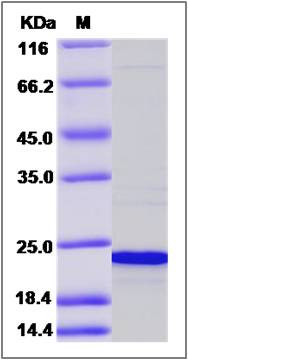Human CIRBP / Cold-inducible RNA-binding Protein (His Tag)
CIRP
- 100ug (NPP2017) Please inquiry
| Catalog Number | P14578-H07E |
|---|---|
| Organism Species | Human |
| Host | E. coli |
| Synonyms | CIRP |
| Molecular Weight | The recombinant human CIRBP consists of 187 amino acids and predicts a molecular mass of 20.5 KDa. It migrates as an approximately 23 KDa band in SDS-PAGE under reducing conditions. |
| predicted N | His |
| SDS-PAGE |  |
| Purity | > 90 % as determined by SDS-PAGE |
| Protein Construction | A DNA sequence encoding the human CIRBP (Q14011) (Met1-Glu172) was expressed with a polyhistide tag at the N-terminus. |
| Bio-activity | |
| Research Area | Cell Biology |Cell Cycle |Cell division |Other cell division related protein |
| Formulation | Lyophilized from sterile 20mM Tris, 500mM NaCl, 0.25M Imi, 20% glycerol. 1. Normally 5 % - 8 % trehalose and mannitol are added as protectants before lyophilization. Specific concentrations are included in the hardcopy of COA. |
| Background | CIRBP, also known as cold-inducible RNA-binding protein, plays a protective role in the genotoxic stress response by stabilizing transcripts of genes involved in cell survival. CIRBP responds to a wide array of cellular stresses, including short wavelength ultraviolet light (UVC), at the transcriptional and post-translational level. It acts as a translational activator.CIRBP can bind the 3 translated region of specific transcripts to stabilize them and facilitate their transport to ribosomes for translation. CIRBP affects NF-κB signaling as opposed to IL1B mRNA stability directly. |
| Reference |
